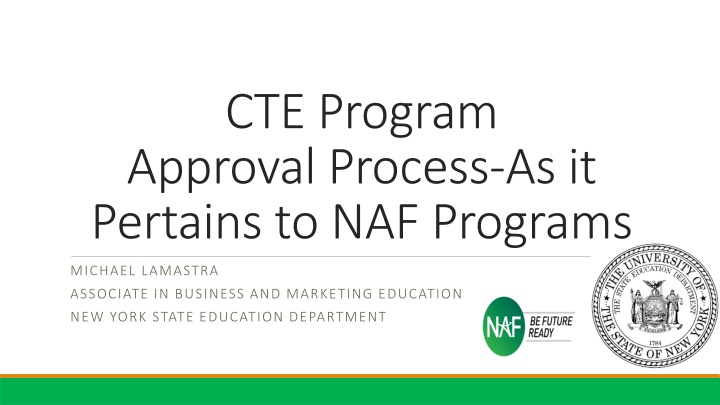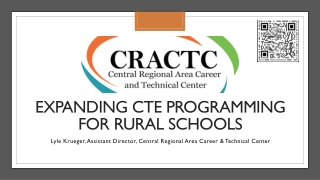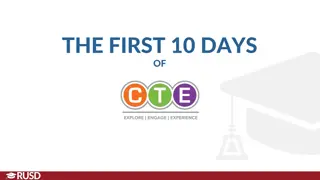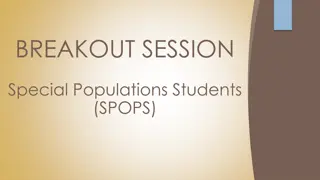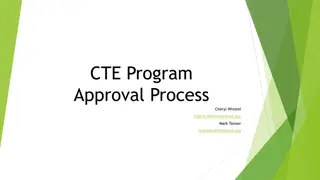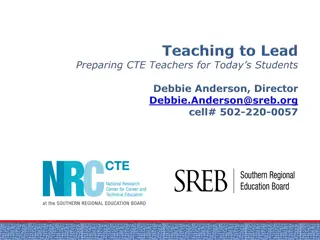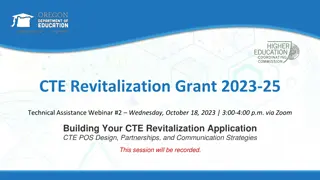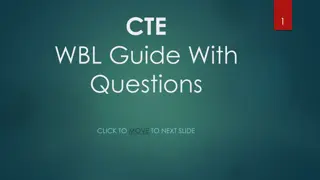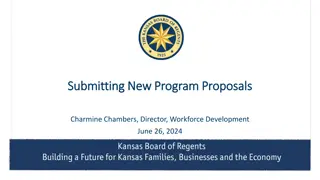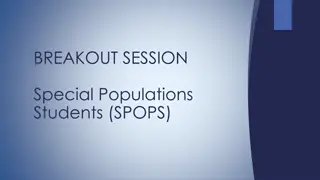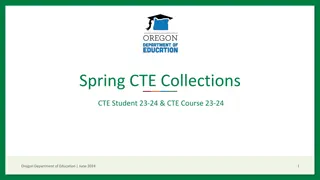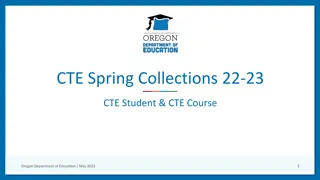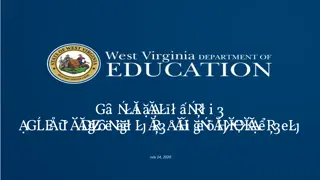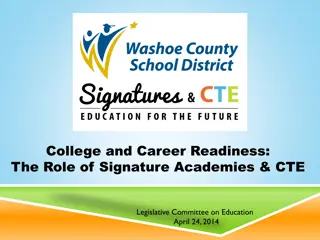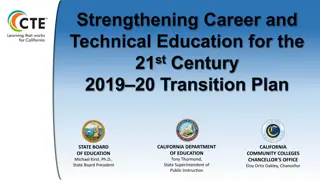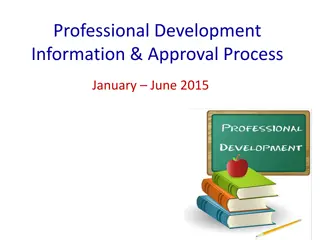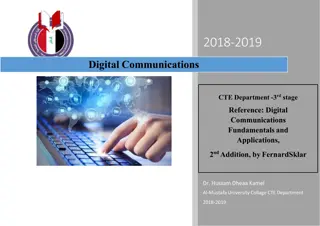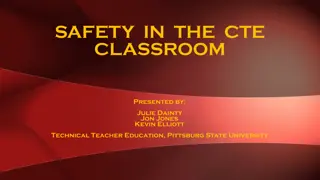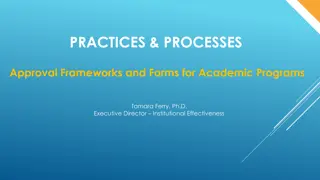CTE Program Approval Process for NAF Programs in New York
This presentation delves into the alignment of NAF programs with New York's graduation pathways, requirements for CTE approved programs, and finding common ground for successful practices. It discusses the definition of an approved program of study, postsecondary credentials, and New York's regulations for program of study.
Download Presentation

Please find below an Image/Link to download the presentation.
The content on the website is provided AS IS for your information and personal use only. It may not be sold, licensed, or shared on other websites without obtaining consent from the author.If you encounter any issues during the download, it is possible that the publisher has removed the file from their server.
You are allowed to download the files provided on this website for personal or commercial use, subject to the condition that they are used lawfully. All files are the property of their respective owners.
The content on the website is provided AS IS for your information and personal use only. It may not be sold, licensed, or shared on other websites without obtaining consent from the author.
E N D
Presentation Transcript
CTE Program Approval Process-As it Pertains to NAF Programs MICHAEL LAMASTRA ASSOCIATE IN BUSINESS AND MARKETING EDUCATION NEW YORK STATE EDUCATION DEPARTMENT
Goals of Presentation 1. To provide education on the multiple pathways for graduation in New York and how a NAF program can satisfy multiple pathways 2. To review the requirements for a CTE Approved Program in New York 3. (Overarching) to find common ground where NAF programs align with the program approval process. This way successful practices can be duplicated
Acknowledgements -National Academy Foundation -Heather Hartmann and the other academy teachers
Multiple Pathways to Graduation -Arts -Bi-Literacy -CDOS -CTE Approved Program -Humanities -STEM
Definition of an Approved Program of Study (Federal) CTE program of study as a coordinated, non-duplicative sequence of academic and technical content at the secondary and postsecondary level that incorporates challenging, state-identified academic standards; addresses academic and technical knowledge, as well as employability skills (a purposefully undefined term in the law); is aligned to the needs of industries in the state, region, Tribal community, or local area; progresses in content specificity; has multiple entry and exit points that allow for credentialing; and ultimately culminates in the attainment of a recognized postsecondary credential.
Definition of "Postsecondary Credential" industry-recognized credentials, certificates, or associate degrees to ensure funding remains focused on sub-baccalaureate credentials This measure is used by the Federal Government as well as New York State in the use of industry-based technical assessments in approved programs. With the transition to Perkins V, we will be seeking input from stakeholders about the state of CTE in New York.
New York Requirements for a Program of Study (Section 100.5 Regulations) A technical and academic curriculum that achieves the commencement level of the appropriate New York State learning standards for all courses in the career and technical education program, including integrated and/or specialized English, mathematics, science, economics and government, and faculty with state certification in appropriate academic and/or technical subjects; identification of the technical assessment to be used for each career and technical education program area identification of any postsecondary articulation agreements
New York Requirements (continued) -Identification of work-based learning experiences for students; -A work skills employability profile to document student attainment of technical knowledge, work-related skills, endorsements and licenses; and -An assurance that data on student progress and performance will be made available to evaluate success on Regents examinations or approved alternatives, technical assessments, and placement in employment, the military or postsecondary education programs;
Stackable Credentials Advanced Regents Diploma with CTE Approved Program and technical endorsement Advanced Regents Diploma with 5-unit Local Sequence Regents Diploma with CTE Approved Program and technical endorsement Regents Diploma with CDOS Pathway
CDOS Pathway for Graduation -May be used for all students as a 4+1 pathway -216 hours (2 credits) of CTE instruction -54 hours of which must be work-based learning -Would strongly encourage individuals to obtain work-based learning certification if you do not already have it -All coursework must be taught by a CTE teacher (agriculture, business, FACS, health sciences, technology education, trade and technical)
Components of a CTE-Approved Program 1. Career development and employability skills (CFM or its equivalent) 2. Coursework concentrated in a particular CTE area of study (at least three full units of instruction). 3. Access to work-based learning 4. A three-part, end-of-program, industry standards-based technical assessment 5.Employability profiles (technical and professional skills) 6. Thoughtful internal and external review-to ensure it meets current industry and local labor market standards 7. Reapproval every five years
Regents Diploma + CTE Program Complete all requirements for graduation (22.5 units) and 5 Regents Exams (1 exam each in ELA, math, social studies, and science) and +1 -4 units of English -4 units of social studies -3 units of mathematics -3 units of science -1 unit of LOTE -1 unit of fine/performing arts -.5 unit of health education -2 units of physical education -4 units of electives Plus successfully complete a CTE-approved program pathway (can fill in electives)
Advanced Regents Diploma (via a local business sequence) -Complete all requirements for a Regents diploma (prior slide) -Two additional math Regents (Geometry and Algebra II/Trig) -Two Regents exams total in science (one life and one physical science) -Five-unit sequence in an art or CTE area -No specific course requirements for the five units, but CFM or its equivalent is recommended -There are good CTE programs that are not NYS approved More information
Advanced Regents Diploma + CTE -CTE technical assessment can replace the Global History Regents only -It is a recommended practice to build in five units to provide students with the advanced Regents diploma even if they do not pass the technical assessment. -Kids can always do more, but not less -A technical endorsement may be given only if all approved parts of the program are met
Part A: Program Information -May use vendor content, but vendor names cannot be included in the NYSED registered title -Internally, call the program whatever entices students to take it! -One contact person per site -Recommended CIP Codes -52.0301 Accounting (Academy of Finance) 52.0304 Accounting and Finance (Academy of Finance) 52.0899 Finance and Financial Services, other (Academy of Finance) 52.0901 Hospitality Services Management (Academy of Hospitality and Tourism) 11.0101 Computer and Information Sciences, General (Academy of Information Technology) 11.0801 Web Page, Digital Multimedia, and Information Resources Design (Academy of Information Technology)
Part B: Program Data -Projected program enrollments -IEP/504 numbers -For reapprovals, be prepared to clarify any discrepancies in the numbers of students taking or passing the technical endorsement
Part C: Self-Study -Reference implementation guide for specifics -Where we are now and where do we need to be -First step once the school has decided pursuing an approved program -Should include Review of current curriculum Review of current performance assessment (if reapproval) Review of resources and content Availability of work-based learning Minutes and signatures should be kept Clear recommendations for next steps
Part D: Content Requirements -Career and Financial Management (.5 unit) -At least three units of appropriate CTE content -All content must be taught by an appropriately certified CTE teacher
Part D: Career and Financial Management -CFM can be taught as a stand-alone course or embedded throughout courses in the program. -New 2018 CFM Framework-ensure what is taught matches up. -I have included a crosswalk document that can aid with embedding CFM in the program.
Part D: Content Requirements Approvable Accounting/Finance Programs must have at least two units of accounting/finance course content. These courses can include -Accounting -College Accounting -Business/Financial Math -Business Finance -Personal Finance (Beyond CFM requirement)
Part D: Hospitality Programs -Hospitality and tourism encompasses the management, marketing, and operations of restaurants and other food services, lodging, attractions, recreation events, and travel-related services (Advance CTE, 2019) -Suggested Program Options (based off Career Cluster Pathways) Restaurants and Food/Beverage Services Lodging Travel and Tourism Recreation, Amusements, and Attractions General Hospitality & Tourism Industry (should include exposure to all four areas above)
Part E: Work-Based Learning and NAF Internship -Two types of programs: registered and non-registered -Would highly suggest registering as a co-op Requires a certified work-based learning coordinator Must allow coordinator time for at least two visits Allows for extra elective credit Allows for job-specific supervision and coaching Co-op=108 hours for 1 credit. NAF internship=120 hours -If not, then it can be an unregistered school year/summer internship -Additional information is available in the Work-Based Learning Manual
Part F: Employability Profiles -For NYSED, summative employability profiles are required assessing both technical and professional (21stcentury skills) -1-2 pages -Almost like a resume -Formative employability profiles are useful tools for teachers, but are not required for NYSED registration Sample accounting/finance employability profile Sample 21stcentury skill employability profile
Part G: Technical Assessment A technical assessment is an industry-developed assessment consisting of written examination(s), student project(s) and student demonstration(s) of technical skills to measure proficiency in a specific technical field through the application of national standards in such technical field. If no assessment exists in a particular technical field, a school district and/or board of cooperative educational services may form a consortium to solicit local, regional or national businesses or related professional organizations to create an assessment. (Commissioner s Regulations 100.5(d)(6)(b))
Part G: Technical Assessment Written and Performance Component -Third party developed -Aligned with industry standards, psychometrically evaluated -Must assess the entire program s content, not just one course s content Locally Developed Project/Portfolio -Locally developed and approved -Can include projects, NAFTrack Exam Scores, and other items indicative of student success.
Technical Assessments that are approvable by NYSED for Finance Programs DISCLAIMER: This is not an exhaustive list. NYSED does not officially endorse any particular exam. There may be others that are not listed here -NOCTI Accounting Basic (4100) - Accounting Advanced (4900) -Precision Accounting I (210) -Precision Banking and Finance (235) -Microsoft Office User Specialist-Excel (Performance Only) -NOCTI Banking and Related Services (1096) (Written Only) -NOCTI Business Financial Management (1095) (Written Only)
Technical Assessments that are approvable by NYSED for Hospitality Programs -NOCTI 4436 Culinary Arts I (Prep Cook) -NOCTI 1289 Recreation, Amusement, and Attractions (written only) -NOCTI 4536 Culinary Arts, Level II (Cook) -NOCTI 1288 Travel and Tourism -NOCTI 4120 Commercial Foods -Precision 410 Hospitality and Tourism -NOCTI 3079 Hospitality Management, Food and Beverage -Precision 414 Lodging and Recreation -NOCTI 3080 Hospitality Management, Lodging -Precision 340 Food and Nutrition -Precision 345 Food Service/Culinary Arts -NOCTI 1287 Lodging (written only)
Part H: Postsecondary Articulation Agreement Must Include: -Beginning and end date (it can say something to the extent of will be reviewed annually or until both parties agree to end -Signatures from both the school district and college -A statement of what students will particularly get (college credit, advanced standing, etc.) -See guidance or administrator for assistance as they will most likely have this information
Part I: Faculty -Must be appropriately certified CTE teachers in the content that you are teaching -Include copies of your certificates or a printout from TEACH with your application -Remove social security numbers
Part J: External Review -Reviews recommendations of the self-study team and proposed program changes -Signatures must be submitted with NYSED Application -Keep agenda and minutes of meetings along with clear feedback -Should include: Secondary teachers (both CTE and non-CTE) Industry representatives Postsecondary representatives Not people from the self-study team, where possible
Part K: Administrative Signature -Ensure that this is not forgotten -Send in both a paper copy and an e-mail of all application materials to emsscte@nysed.gov -Application itself needs to be in MS Word -Part 2 and any accompanying materials can be in PDF
